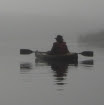I found a good overview of recent news about climate change and related politics, by Lord Robert May, president of the UK's national academy of science, the Royal Society (posted yesterday at the Environment News Service).
My thinking on climate change has shifted recently. I used to be fervent about warning people and convincing them to change before it is too late. Now there is too much evidence that it is already too late; the changes are well underway. Maybe we can still limit the impacts with swift action, but as Lord May points out:
. . . we have here a classic example of the problem or paradox of co-operation - also known as the Prisoner's Dilemma or occasionally the Tragedy of the Commons - referred to at the outset - the science tells us clearly that we need to act now to reduce inputs of greenhouse gases; but unless all countries act in equitable proportions, the virtuous will be economically disadvantaged whilst all suffer the consequences of the sinners' inaction.I was intrigued to see that, when listing four major areas of action on climate change, Lord May said, "First, we can adapt to change . . ." I believe there is growing agreement that we will not be able to prevent significant, rapid, human-induced climate change. Instead we must find ways to adapt.
Here on the prairies, modelling suggests that forests will retreat northward, and island forests such as that of our Moose Mountains will shrink and change, if not disappear. It seems ironic that in the recent Throne Speech, Premier Calvert announced:
Agroforestry, including the growing of trees as crops, is underway. My government has a bold vision for the future of this industry. Over the next twenty years, the goal will be to transform ten per cent of the arable land of Saskatchewan to agroforestry, creating another sustainable industry in our province.Umm, the arable land is in the south, and the forests are moving north. How is this "bold vision" going to work?





No comments:
Post a Comment